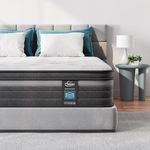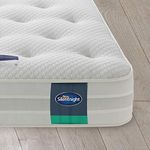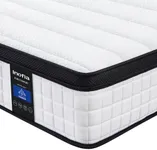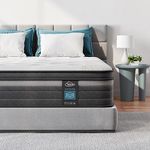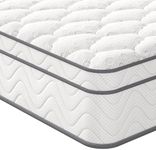Buying Guide for the Best Mattresses
Choosing the right mattress is crucial for a good night's sleep and overall health. The right mattress can help alleviate back pain, improve sleep quality, and ensure you wake up feeling refreshed. When selecting a mattress, consider your sleeping position, body type, and any specific health concerns you may have. Here are some key specifications to consider when choosing a mattress.Mattress TypeThe type of mattress refers to the materials and construction used. Common types include innerspring, memory foam, latex, and hybrid. Innerspring mattresses are bouncy and provide good support, making them suitable for back and stomach sleepers. Memory foam mattresses contour to your body, offering excellent pressure relief, ideal for side sleepers and those with joint pain. Latex mattresses are durable and offer a balance of support and comfort, suitable for all sleeping positions. Hybrid mattresses combine innerspring coils with foam or latex layers, providing a mix of support and comfort. Choose a mattress type based on your preferred sleeping position and comfort needs.
Firmness LevelFirmness level indicates how soft or hard a mattress feels. It is usually rated on a scale from 1 to 10, with 1 being very soft and 10 being very firm. Soft mattresses (1-3) are best for side sleepers and those who need extra cushioning. Medium mattresses (4-6) are suitable for back sleepers and those who prefer a balance of support and comfort. Firm mattresses (7-10) are ideal for stomach sleepers and those who need more support to prevent sinking. Consider your sleeping position and personal comfort preference when choosing the firmness level.
SupportSupport refers to how well a mattress maintains an even surface and keeps your spine aligned. Good support is essential for preventing back pain and ensuring a comfortable sleep. Innerspring and hybrid mattresses typically offer strong support due to their coil systems. Memory foam and latex mattresses provide support by contouring to your body and distributing weight evenly. If you have back pain or need extra support, look for a mattress with a robust support system that keeps your spine in a neutral position.
Motion IsolationMotion isolation is the mattress's ability to absorb movement and prevent it from transferring across the bed. This is important if you share your bed with a partner, as it minimizes disturbances from their movements. Memory foam and latex mattresses generally offer excellent motion isolation, while innerspring mattresses may transfer more motion. If you are a light sleeper or have a partner who moves a lot during the night, consider a mattress with good motion isolation.
Temperature RegulationTemperature regulation refers to how well a mattress can maintain a comfortable sleeping temperature. Some mattresses tend to retain heat, which can cause discomfort during the night. Memory foam mattresses are known for retaining heat, while innerspring and latex mattresses typically offer better airflow and cooling. Hybrid mattresses with cooling technologies, such as gel-infused foam or breathable covers, can also help regulate temperature. If you tend to sleep hot, look for a mattress with good temperature regulation features.
Edge SupportEdge support is the mattress's ability to provide a stable and supportive edge. This is important for those who sit or sleep near the edge of the bed, as it prevents sagging and provides a larger usable sleeping surface. Innerspring and hybrid mattresses often have reinforced edges, while memory foam mattresses may have weaker edge support. If you need a mattress with strong edge support, consider one with reinforced edges or a sturdy coil system.
DurabilityDurability refers to how long a mattress will maintain its comfort and support over time. A durable mattress is made from high-quality materials and has a robust construction. Latex and hybrid mattresses are generally more durable, lasting up to 10 years or more. Memory foam and innerspring mattresses may have a shorter lifespan, typically around 7-8 years. Consider the durability of a mattress if you want a long-lasting investment and look for warranties that reflect the expected lifespan.






